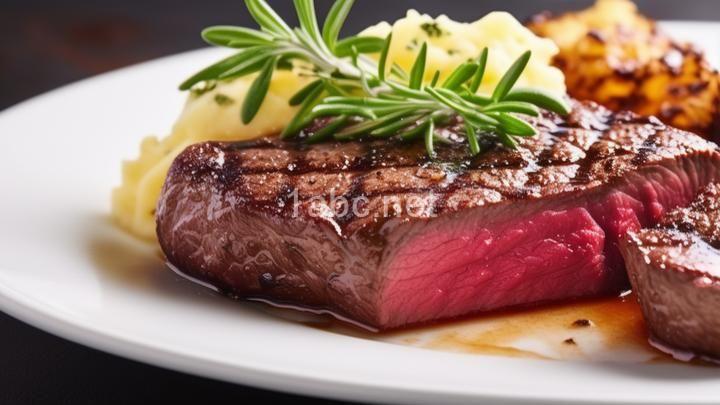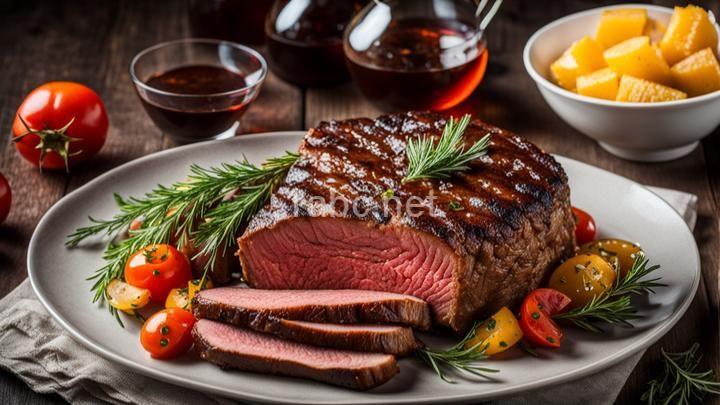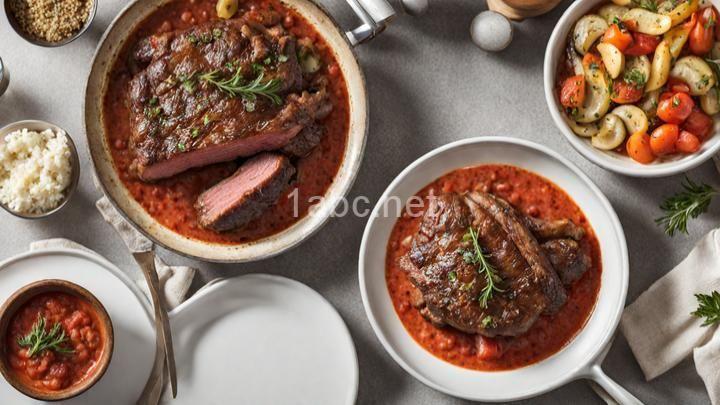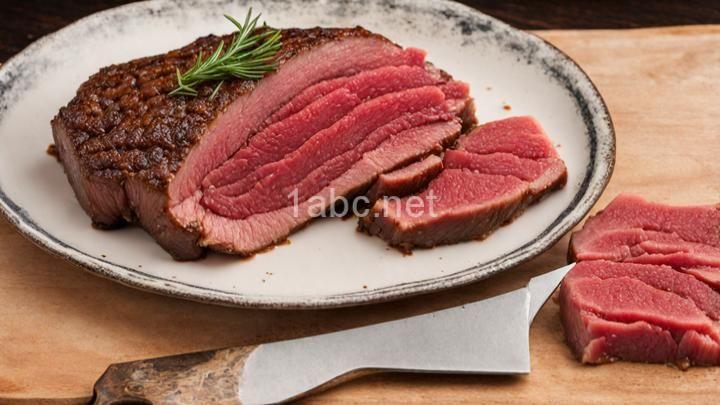The Ultimate Guide to Marinating Beef: Tips, Tricks, and Recipes

Introduction:
Welcome, dear readers, to the ultimate guide on marinating beef! Today, we embark on a journey to unlock the secrets of infusing flavors and tenderness into our beloved cuts of beef. Whether you're a seasoned chef or a cooking novice, this guide will equip you with the knowledge and skills to elevate your culinary game. So, grab your aprons and let's dive into the wonderful world of marinated beef!
I. Understanding the Basics of Marinating Beef:
A. What is Marination?
Marination, my friends, is a process where meat is soaked in a flavorful liquid or rubbed with a mixture of herbs and spices to enhance its taste, tenderness, and juiciness. It's like giving your beef a luxurious spa treatment that leaves it mouthwateringly delicious!
When we marinate beef, the magic happens as the flavors from the marinade seep into the meat, infusing it with a symphony of taste sensations. This not only adds depth to the flavor but also helps to tenderize tougher cuts of meat, making them melt-in-your-mouth tender. It's like a flavor party in your mouth!
B. Types of Marinades:
1. Wet Marinades:
Now, let's talk about wet marinades. These are the most common types of marinades and involve soaking the beef in a liquid mixture. The liquid can be a combination of ingredients like oils, acids (such as vinegar or citrus juice), herbs, spices, and even soy sauce.
Wet marinades work wonders by breaking down the muscle fibers of the beef, allowing those delicious flavors to penetrate deep into the meat. Plus, they help to lock in moisture, ensuring your beef stays juicy and tender as it cooks. It's like a flavor-infusing spa treatment for your beef!
Some popular wet marinade ingredients include soy sauce, Worcestershire sauce, garlic, ginger, lemon juice, and various herbs and spices. Don't be afraid to get creative and experiment with different flavors to find your perfect marinade!
2. Dry Rubs:
If you want to switch things up a bit, dry rubs are an excellent alternative to wet marinades. Instead of a liquid mixture, dry rubs consist of a combination of herbs, spices, and sometimes even salt and sugar. You simply rub this mixture onto the surface of the beef, allowing the flavors to seep in and work their magic.
Dry rubs are fantastic for creating a flavorful crust on the outside of your beef while keeping the inside tender and juicy. They're perfect for those who prefer a more intense flavor profile without the added moisture of wet marinades. It's like adding a flavorful coat of armor to your beef!
Some popular dry rub combinations for beef include a mix of paprika, cumin, garlic powder, onion powder, salt, and pepper. Of course, you can get as creative as you like with your own combinations of herbs and spices to suit your taste buds.
C. Beef Cuts Suitable for Marination:
Now that we've covered the basics of marination, let's talk about the cuts of beef that are best suited for this flavorful process. While you can technically marinate any cut of beef, certain cuts are more receptive to the marinating process and can benefit greatly from it.
Cuts such as flank steak, skirt steak, and sirloin are excellent choices for marinating. These cuts have a bit more chew and can be tough if not prepared properly. Marinating them not only helps to tenderize the meat but also adds incredible flavor. It's like transforming a humble cut of beef into a succulent masterpiece!
On the other hand, more tender cuts like filet mignon and ribeye don't necessarily need marinating since they are already tender and packed with flavor. However, if you're feeling adventurous, you can still experiment with marinades to enhance their taste even further. It's all about exploring and finding what tickles your taste buds!
II. Tips and Tricks for Successful Marinating:
A. Preparing the Meat for Marination:
1. Trimming Excess Fat:
Before you dive into the marinating process, it's important to trim any excess fat from your beef. While fat adds flavor, too much of it can prevent the marinade from fully penetrating the meat. Plus, it can lead to flare-ups on the grill or a greasy mess in the pan.
To trim the fat, start by placing the beef on a cutting board and using a sharp knife, carefully remove any visible fat. Be sure to leave a thin layer of fat, as it adds flavor and moisture to the meat. Trim away any connective tissue as well, as it can be tough and chewy. It's like giving your beef a fresh makeover!
2. Tenderizing Techniques:
If you're working with tougher cuts of beef, tenderizing is a fantastic technique to ensure that your meat is tender and juicy. There are a few methods you can use to tenderize beef before marinating.
One common method is using a meat tenderizer tool, which has small blades or spikes that pierce the surface of the meat. This process breaks down the muscle fibers, making the beef more tender and allowing the marinade to penetrate deeper. It's like a mini massage for your beef!
Another natural tenderizing technique is using acidic ingredients like pineapple juice or papaya puree. These fruits contain enzymes that break down proteins, making the meat more tender. Simply marinate your beef in the acidic mixture for a designated amount of time, and voila! Tender, flavorful beef awaits you!
B. Proper Marinating Times and Temperatures:
1. Refrigeration Guidelines:
When it comes to marinating beef, timing is everything. It's essential to marinate your beef for the right amount of time to ensure maximum flavor infusion without compromising the texture of the meat. The refrigerator is your best friend in this marinating endeavor.
As a general rule of thumb, marinate your beef in the refrigerator for at least 30 minutes to a maximum of 24 hours. For tougher cuts, longer marinating times are recommended to break down the muscle fibers. However, be cautious not to over-marinate, as the meat can become mushy and lose its texture. It's like finding the perfect balance between relaxation and action!
2. Room Temperature Marination:
While refrigeration is the safest and most recommended method for marinating beef, there are instances where room temperature marination can work too. Room temperature marination can be suitable for smaller cuts of beef or when you're short on time. However, caution must be exercised to ensure food safety.
If you choose to marinate at room temperature, limit the marinating time to no more than two hours. The key is to keep a close eye on the beef to prevent any bacterial growth. It's like enjoying a quick spa treatment without lounging around for too long!
III. Flavorful Marinade Recipes:
A. Classic Teriyaki Marinade:
Let's kick off our marinade recipe extravaganza with a classic favorite: Teriyaki Marinade. This sweet and savory concoction will transport your taste buds straight to Japan, adding a delightful Asian twist to your beef. Here's a simple recipe to get you started:
Ingredients:
- 1/4 cup soy sauce
- 2 tablespoons honey
- 2 tablespoons rice vinegar
- 2 garlic cloves, minced
- 1 tablespoon grated ginger
- 1 tablespoon sesame oil
- 1 teaspoon cornstarch (optional, for thickening)
Instructions:
-
In a bowl, whisk together the soy sauce, honey, rice vinegar, minced garlic, grated ginger, and sesame oil until well combined. If you prefer a thicker sauce, whisk in the cornstarch.
-
Place your choice of beef cuts in a shallow dish or resealable bag and pour the teriyaki marinade over the beef, ensuring it is well coated. Cover or seal the dish/bag and refrigerate for at least 30 minutes (or up to 24 hours for a more intense flavor).
-
When you're ready to cook your marinated beef, remove it from the marinade and discard any excess liquid. Grill, broil, or pan-sear the beef to your desired level of doneness. Don't forget to brush some of the reserved marinade onto the beef during cooking for an extra burst of flavor!
Variations/Additions:
- For a touch of heat, add a teaspoon of chili garlic sauce or a pinch of red pepper flakes to the marinade.
- Enhance the umami factor by adding a tablespoon of mirin or oyster sauce to the marinade.
- Sprinkle toasted sesame seeds and sliced green onions over the cooked beef for added visual appeal.
B. Zesty Citrus Marinade:
If you're in the mood for something bright and refreshing, look no further than this zesty citrus marinade. Bursting with tangy flavors, it's the perfect companion for beef cuts that crave a hint of acidity. Let's get juicing!
Ingredients:
- 1/4 cup freshly squeezed citrus juice (lemon, lime, or orange)
- 2 tablespoons olive oil
- 2 garlic cloves, minced
- 1 tablespoon honey or maple syrup
- 1 teaspoon lemon zest
- Salt and pepper to taste
Instructions:
-
In a bowl, whisk together the citrus juice, olive oil, minced garlic, honey (or maple syrup), lemon zest, salt, and pepper until well combined.
-
Place your beef cuts in a shallow dish or resealable bag, and pour the zesty citrus marinade over the beef, ensuring it is evenly coated. Cover or seal the dish/bag and refrigerate for at least 30 minutes (or up to 24 hours for a more intense flavor).
-
When you're ready to cook your marinated beef, remove it from the marinade, allowing any excess liquid to drip off. Grill, broil, or pan-sear the beef to your desired level of doneness. The bright and tangy flavors of the citrus marinade will surely awaken your taste buds!
Pairing suggestions:
- This zesty citrus marinade pairs beautifully with cuts like flank steak or skirt steak, adding a burst of freshness to balance out their rich flavors.
- Serve the cooked beef slices over a bed of mixed greens tossed in a citrus vinaigrette for a refreshing salad.
C. Spicy BBQ Marinade:
For all my spicy food lovers out there, this Spicy BBQ Marinade will set your taste buds ablaze with its fiery goodness. It's the perfect way to add a kick to your beef and take your grilling game to the next level. Get ready for a flavor explosion!
Ingredients:
- 1/4 cup ketchup
- 2 tablespoons brown sugar
- 2 tablespoons Worcestershire sauce
- 1 tablespoon Dijon mustard
- 1 tablespoon apple cider vinegar
- 2 teaspoons hot sauce (adjust to taste)
- 1 teaspoon smoked paprika
- 1 teaspoon garlic powder
- Salt and pepper to taste
Instructions:
-
In a bowl, whisk together the ketchup, brown sugar, Worcestershire sauce, Dijon mustard, apple cider vinegar, hot sauce, smoked paprika, garlic powder, salt, and pepper until well combined.
-
Place your beef cuts in a shallow dish or resealable bag, and pour the spicy BBQ marinade over the beef, ensuring it is thoroughly coated. Cover or seal the dish/bag and refrigerate for at least 30 minutes (or up to 24 hours for a bolder flavor).
-
When you're ready to unleash the spicy deliciousness, remove the beef from the marinade, allowing any excess liquid to drain off. Grill, broil, or pan-sear the beef to your desired level of doneness. Brace yourself for a tongue-tingling experience!
Pairing suggestions:
- This spicy BBQ marinade is perfect for beef cuts like ribs or tri-tip, as it complements their hearty flavors and adds a fiery twist.
- Serve the cooked beef slathered in additional BBQ sauce, alongside
FREQUENTLY ASKED QUESTIONS
What is marinating and why is it important for beef?
Marinating is the process of soaking meat in a mixture of ingredients, such as oil, acid (like vinegar or citrus juice), and various spices or herbs, to enhance its flavor and tenderness. When it comes to beef, marinating is important for several reasons.Firstly, marinating helps to tenderize the beef. The acids in the marinade can break down the tough muscle fibers in the meat, resulting in a more tender and juicy texture. This is especially beneficial for tougher cuts of beef, such as flank steak or skirt steak.
Secondly, marinating adds flavor to the beef. The combination of ingredients in the marinade infuses the meat with delicious flavors, making it more enjoyable to eat. Different marinades can provide a range of tastes, from tangy and savory to sweet and spicy, allowing you to customize the flavor profile to your liking.
Additionally, marinating can also help to add moisture to the beef. The oil in the marinade helps to prevent the meat from drying out during the cooking process, resulting in a more succulent and flavorful end result.
Lastly, marinating can also act as a form of food preservation. The acidic nature of the marinade can help inhibit the growth of bacteria on the meat, extending its shelf life and ensuring its safety for consumption.
In conclusion, marinating beef is important because it tenderizes the meat, enhances its flavor, adds moisture, and helps to preserve it. By taking the time to marinate your beef, you can elevate its taste and texture, resulting in a more enjoyable dining experience.
How long should I marinate beef?
When it comes to marinating beef, the duration can vary depending on the type and cut of meat you're working with. Generally, it's recommended to marinate beef for at least 30 minutes to allow the flavors to penetrate the meat. However, for tougher cuts like roasts or steaks, you might want to marinate for a longer period of time, such as 6 hours or even overnight, to help tenderize the meat. It's important to note that marinating for too long can result in the meat becoming mushy or overly flavored, so it's best to follow specific recipes or guidelines for marinating times. Ultimately, the desired outcome and personal preference should also be taken into consideration when determining how long to marinate your beef.
What ingredients can I use to make a marinade for beef?
To make a delicious marinade for beef, you can use a variety of ingredients to enhance the flavor of your meat. Here are some popular options:
- Soy sauce: It adds a savory and salty taste to the beef while also tenderizing the meat.
- Worcestershire sauce: This tangy sauce adds a depth of flavor and helps to tenderize the beef.
- Garlic: Whether minced, powdered, or in the form of garlic paste, it brings a robust and aromatic element to the marinade.
- Onion: Chopped or grated onions add sweetness and flavor to the beef.
- Citrus juice: Lemon, lime, or orange juice can help to tenderize the meat and add a refreshing tanginess.
- Olive oil: It not only helps to coat the beef but also adds richness and moisture to the meat.
- Vinegar: Whether using balsamic, red wine, or apple cider vinegar, it can add a tangy and acidic note to the marinade.
- Brown sugar or honey: These sweeteners can balance out the flavors and add a touch of caramelization to the beef.
- Dijon mustard: It adds a tangy and slightly spicy kick to the marinade.
- Fresh herbs: Whether using rosemary, thyme, parsley, or cilantro, they can provide a fresh and aromatic element to the marinade.
Remember, you can combine these ingredients in different proportions to create your desired flavor profile. Additionally, feel free to experiment with other spices and seasonings to customize your marinade to your taste preferences. Enjoy marinating your beef and enhancing its deliciousness!
Can I marinate beef for too long?
Marinating beef for too long can actually have a negative effect on the texture and taste of the meat. While marinating enhances the flavor and tenderness of the beef, leaving it in the marinade for an extended period can result in the meat becoming mushy or overly saturated with flavors. The ideal marinating time for beef varies depending on the cut and thickness of the meat. Generally, marinating for 30 minutes to 24 hours is sufficient to achieve the desired results.
If you marinate the beef for too long, especially if the marinade contains acidic ingredients like citrus juice or vinegar, the meat can become tough and lose its natural juices. It's important to follow marinating times recommended in recipes or guidelines to ensure that the beef is flavorful and tender.
If you find yourself needing to marinate beef for an extended period, it's best to use a marinade that is less acidic and contains ingredients like oil, herbs, and spices. This will help prevent the meat from becoming overly tenderized and maintain its natural texture.
In summary, marinating beef for too long can negatively impact its texture and taste. It's important to follow recommended marinating times to achieve the desired flavors without compromising the quality of the meat.




